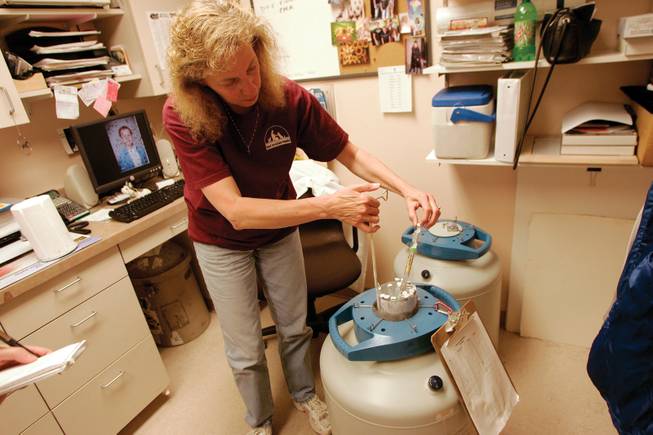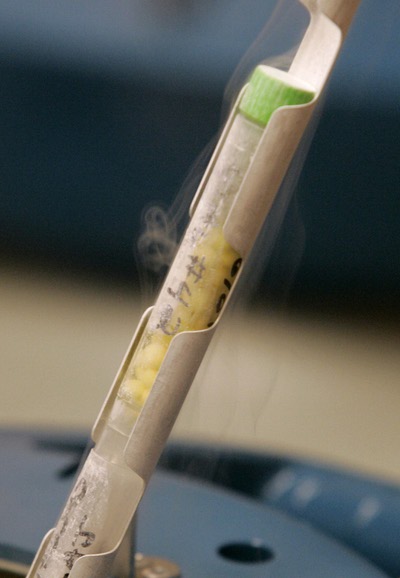Tuesday, April 13, 2010 | 2:05 a.m.
The poodle, according to the American kennel Club breed standard, should have "an air of distinction and dignity peculiar to himself."
Lidos Tequila Sunrise, a Vegas champion poodle, had this plus a puffed apricot coat; a rare auburn body bouffant that owner Susie Osburn has bred into several generations of ginger winners — the extended dog children of Tequila Sunrise, who, despite being dead for more than a decade, continues to produce apricot offspring.
Tequila's line lives on, in liquid nitrogen, at the International Canine Semen Bank of Nevada — a misleading name, really, since the bank also stores semen collected from 15 or so dolphins, and could do the same for any number of animals. (A canine semen bank in Oregon has collected samples from sea turtles, pandas, gila monsters, wolves and boa constrictors, among others. The only reason Nevada doesn't have a frozen menagerie is because nobody's asked yet.)
Tequila is one of roughly 400 dogs who have semen stored at the Nevada bank, which is run out of Dr. Dennis Arn's Desert Inn Animal Hospital, and is the only one of its kind in the state. The entire operation fits into a back room at the vet's clinic, where samples are stored in one of six waist-high metal tanks.
Inside each tank, there are dozens of clear vials, and inside each vial, small yellowing pellets — molded and frozen almost the size of lentils for easy reheating and injection. The first sample was collected and stored in 1998. Properly cared for, it will outlive the doctor and all his patients. Semen kept this cold remains usable for hundreds of years, Arn says. And once frozen, it can be shipped all over the world. The bank just mailed a few vials of Great Dane to Australia.
There's an art to artificial canine insemination — the timing has to be right, the vet's catheter skills have to be sharp, there are assorted veterinary matters to consider.
There's no real art, however, to canine semen collection — our species' shared lament. The male dog is brought to the vet clinic, where he is introduced to the "teaser bitch," a female dog in heat. Enticed, the dogs are stopped just before mating, and the vet collects the semen using "manual stimulation," as a brochure for the bank explains it.
The entire process costs $235, plus a $60 annual storage fee. This is to say nothing of the cost of actually purchasing or inseminating a different dog with frozen semen, which can rival a mortgage payment.
The expense is nothing, however, to the bank's actual clientele — a specific breed of human, exact and particular as the pets they want to preserve. A vial of Tequila's semen sells for $2,000. This does not include shipping or mandatory genetic testing. Tequila will not posthumously breed with just any poodle. This isn't snobbishness — it's caution. Mate the wrong pair of highly bred dogs, and you risk genetic defects.
In the Nevada bank's brochure, some of the listed benefits of frozen semen include: the "ability to breed a stud when he is not available. (Heavily booked, on show circuit, breeding conflicts, disease, sterile or death.)"
It's not only dog breeders who use the bank. Some clients are just people who dearly love their pets, Arn says. Others want to neuter their dogs without losing the option to breed — an idea that could become more appealing to casual pet owners in the City of Las Vegas, where neutering became mandatory on April 1. The ordinance is designed to curb animal overpopulation in Clark County, where tens of thousands of dogs are euthanized annually. If neuter laws bolster usage of canine semen banks, however, it will be much to the chagrin of bank critics, who argue that too many dogs are killed in America to justify the perpetual freeze-breeding of a select few.
Cat spaying also became mandatory last week, and it is possible to extract feline semen, Arn says. It's also possible to collect semen from a pet that has recently died. Harvesting eggs from female dogs, however, is not yet possible. And even though it's not common to clone pets at this point, the bank's brochure suggests frozen tissue preservation for this very purpose is a possibility.
There's only enough of Tequila's semen left for 12 more "breedings," or inseminations. Osburn plans to keep most for herself. She has been breeding poodles for more than 30 years. Like many on the dog-show circuit, she uses "line breeding," mating relatives close enough to maximize desirable traits, but distant enough to avoid inbreeding. Now Osburn sees Tequila's face in her show poodles — the long muzzle, the dark eyes. Now she has dogs that are deep apricot, bordering on red, and always getting darker.
"If they have bred a zenith of their whole line, of their whole career, it's very important to keep those genetics," Arn says.
But there is no perfection. Sure, Osburn once thought she had come close with a male poodle.
"I finally thought it did it," she said. "Then he only dropped one ball."
One testicle meant zero dog shows. Frozen semen or not, Mother Nature meddles.
"She always has a hand in it."
Until she gives up. And this may be the future of animal semen banks: extinction. Dr. Arn cannot say much about the dolphin semen his bank stores, except to note that most was collected from dolphins in amusement park settings, animals so thoroughly under the control of humans they had been trained to ejaculate on command.
For species at risk of becoming extinct, for animals that today live largely in zoos, semen banks are a kind of last gasp — life on life support. This kind of animal semen storage has all the hallmarks of breeding dogs; the fretting about fertility windows, offspring yields, successful pregnancies — but with infinitely higher stakes; Noah's Ark, in liquid nitrogen.
And this sounds no different, really, than Osburn talking about Tequila Sunrise, champion poodle.
"He had something to give," she says. "And we wanted to preserve that for the future."
— Originally published in Las Vegas Weekly



Join the Discussion:
Check this out for a full explanation of our conversion to the LiveFyre commenting system and instructions on how to sign up for an account.
Full comments policy